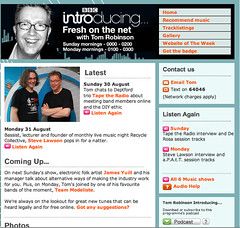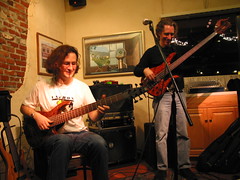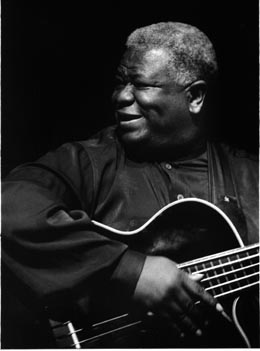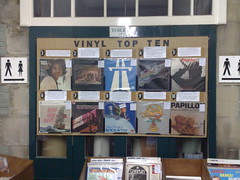 The death of Michael Jackson – like so many celebrity deaths – has brought with it a swathe of responses, both from the public and in the media.
The death of Michael Jackson – like so many celebrity deaths – has brought with it a swathe of responses, both from the public and in the media.
Anyone who ever met him gets dragged out to talk about ‘their relationship’, and anyone remotely famous who might have a connection (be it sharing the pop-charts with him in the 80s, that they at some point in the past expressed a liking for his music, or just happen to be famous and black) is door-stepped for their comment.
It’s a fairly unpleasant media feeding frenzy, but it’s definitely serving a voracious need amongst a large section of the populus to be handed a secular liturgy for mourning the death of someone that, while insanely significant in the history of popular music, hadn’t made a notable artistic contribution in 20 years, and was written off a few years ago as a freaky paedo that many people (without any real evidence or experience of the case) thought escaped jail on a technicality…
For all those of us who hadn’t seen him live in over a decade, only listened to his older records (or not at all), and whose main month to month awareness of his was the reports of his spectacular and mind-boggling financial collapse, the emotional outpouring seems to be more an expression of 3 things:
- a desire for some kind of connection with *the thing that’s going on* – get our opinion in, be part of the public conversation, tell everyone you always thought he was a genius/freak/whatever.
- a sadness – close to grief – for our youth (a deeper expression of the same thing that drives people to watch I Love The 80s)
- a largely unarticulated – but it appears, deeply felt – sense of loss for the age when musical and media megastars could MEAN something. (Andrew Dubber mused on this on Twitter)
Michael Jackson in his day combined musical genius, innovation and fame-beyond-measure. He was a truly global phenomenon. Massive far beyond the reaches of late 70s Ameri-centric radio and the English-speaking world. Larger than life, weirder that weird, but astoundingly gifted. Ever since Off The Wall came out, generation after generation of kids have connected with his music (there’s something about his music that definitely – and in light of the court case from a few years back, disturbingly – connects with pre-teen kids more than almost any other soul/funk-based music).
His creative partnership with Quincy Jones, producer of Off The Wall, Thriller and Bad, produced some of the most iconic moments in the pop canon, but since Bad, he’s produced little that’s considered musically significant (I saw him live in the late 90s, when I interviewed his bassist, Freddie Washington for Bassist Magazine – outstanding show, but definitely all about the decade-plus old hits).
So what do we get out of grieving?
What are the questions we need to ask about the impression we had of him, the false feeling of connection we had with him as a person through his music and the press, and our complicity as part of a media-hungry world that fueled his madness (largely, it seems attributed to a seriously screwed up relationship with his dad, but made worse by his fame-neccesitated isolation).
Neverland, bubbles, oxygen-tanks, Liz Taylor, plastic surgery, llamas, friendships with kids, that documentary… A life documented like a dystopic flip-side to the Truman Show, but one that destroyed him.
At the recent UnConvention conference in Salford, I was asked at the end of our panel on being ‘outside the box’ what my one piece of advice was for musicians looking at their place in the world of music. My comment was
‘it’s more important to be nice than it is to be talented’
if becoming a ‘great musician’, and more pertinently, a ‘famous musician’ turns you into a reclusive lunatic, your priorities are screwed. Quit music, get a job in a bookshop, and leave fame to those whose narcissism is so overpowering they’ll pursue it to their own death.
Michael was rightly celebrated for his musical contribution, but his fame and its destructive influence on his life was out of all proportion to that (how could any music possibly live up to that??) – his public persona was a media-created 2-headed chimera: musical deity and social demon, invented to seed the front pages with stories between the album releases. If the next album’s a turkey, who cares, we’ve got pics of him in an oxygen tent, kissing a monkey dressed in tiny human clothes! Win!
Fame is the downside to success, and the way it removes the consequences from ones actions means that people like MJ who desperately needed help to recover from his screwed up childhood-in-the-spotlight never got it. If you’re heading towards it, in the words of Monty Python’s Holy Grail, “Run away! Run away!â€
Or, indeed, put another way:
“For what is a man profited, if he shall gain the whole world, and lose his own soul? or what shall a man give in exchange for his soul?”
Nothing is worth that.
So, commenters – fame, celebrity, talent… where does it all go from here? What does a tale like this mean for those of us working in music, and using social media to break down the myths around our lives? Is ‘accessibility’ just another myth, once you get beyond a certain as-yet-undefined number of pseudo-personal connections? Have at it!
 Major label collapse, 360 deals, Pirate Bay, Spotify, Bit Torrent, Youtube… It’s clear to anyone with half an eye on the news that something huge is happening in the world of music. And if you believe the majority of the press, it’s universally a bad thing – lots of very sad multi-millionaires are seeing their scarcity cash-cow sacrificed on the alter of ubiquity.
Major label collapse, 360 deals, Pirate Bay, Spotify, Bit Torrent, Youtube… It’s clear to anyone with half an eye on the news that something huge is happening in the world of music. And if you believe the majority of the press, it’s universally a bad thing – lots of very sad multi-millionaires are seeing their scarcity cash-cow sacrificed on the alter of ubiquity.








